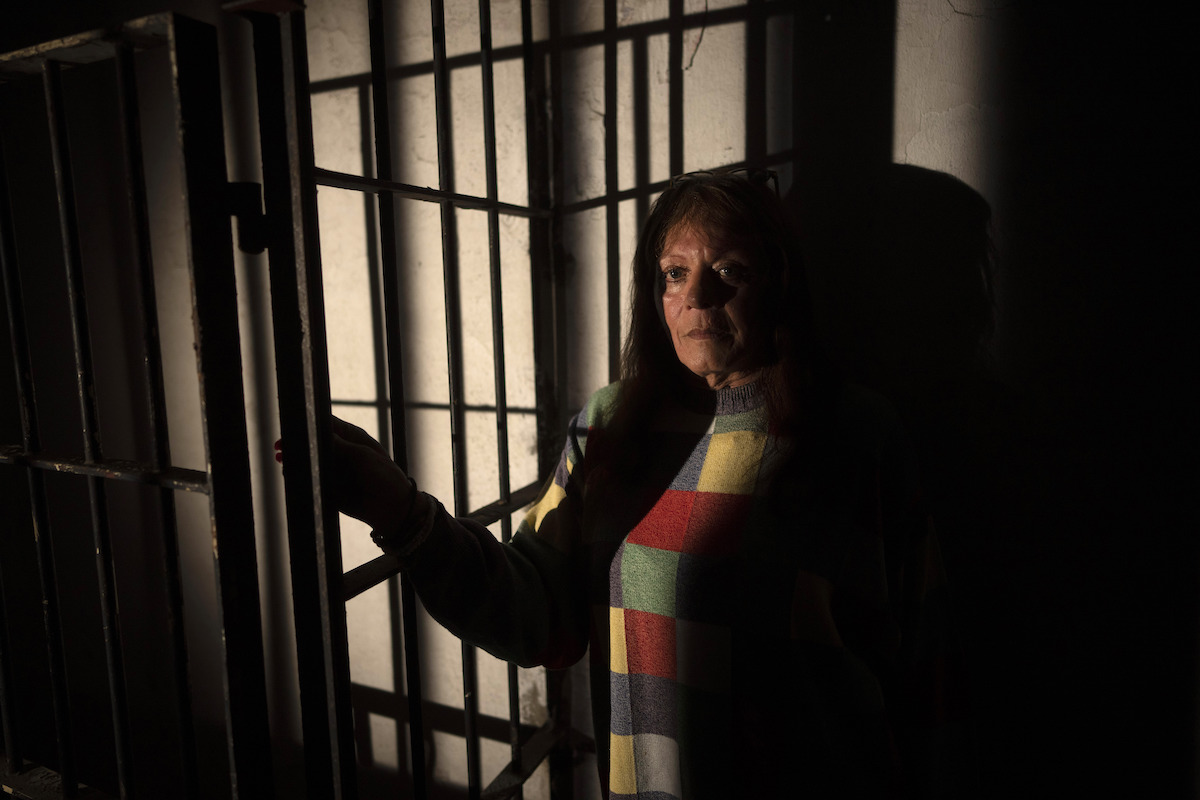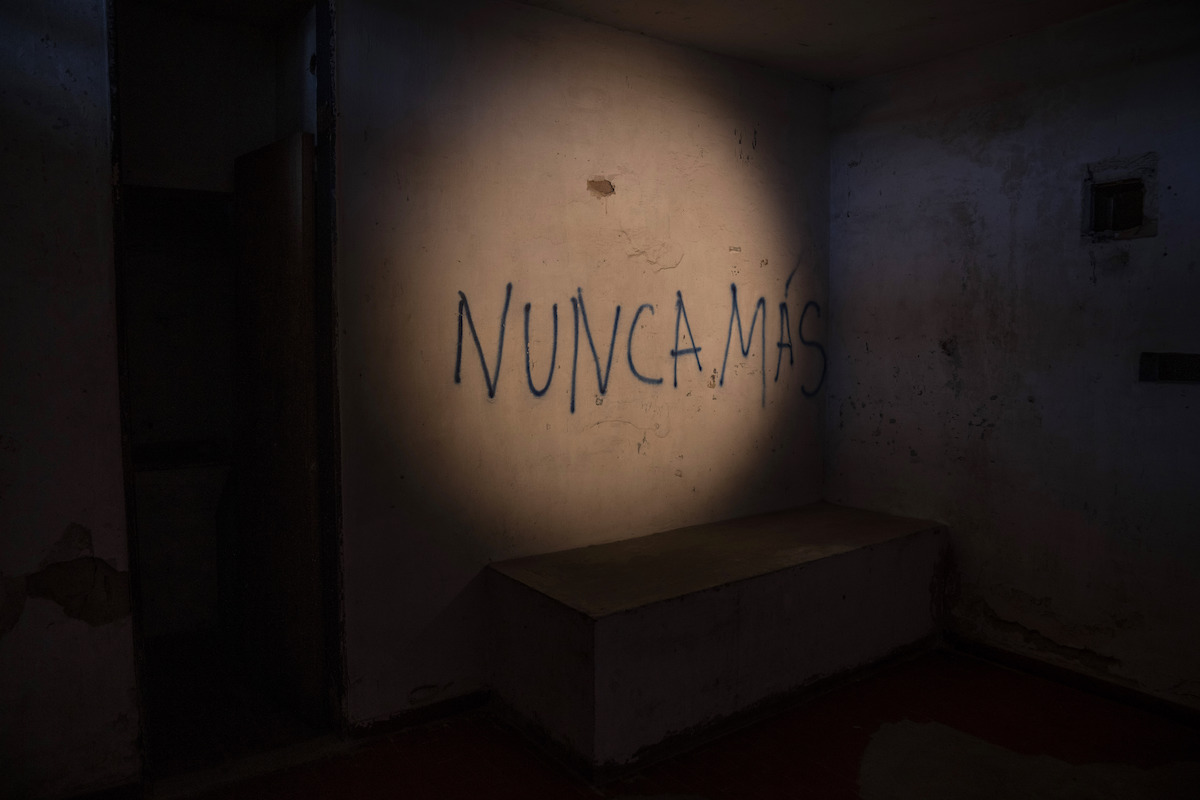

Julieta González poses for a photo inside the Banfield Pit, where the Argentine military dictatorship held her for a month, in Buenos Aires, Argentina, Tuesday, May 23, 2023. (AP Photo/Víctor R. Caivano)
By DANIEL POLITI, Associated Press
BUENOS AIRES, Argentina (AP) — Julieta González stepped inside the blocky white building where the Argentine military dictatorship held her for a month, and the flashbacks began.
Blood stains on the mattresses. Hearing screaming as she was inside her cell. Being forced to wash blood out of cars. The endless sexual abuse.
Transgender women like González often pretended to be asleep when a guard appeared in the middle of the night, she remembered.
“I was always the one who bore the brunt,” González, 65, told AP journalists during a visit to the cell where she was held. “I was younger.”
González and four other transgender women testified at the trial of former security officers in April on charges of crimes against humanity, part of what human-rights lawyers and activists call Argentina’s long-overdue effort to recognize the suffering of the trans community under military rule from 1976 to 1983. Members of the community took part in a demonstration last month in support of a bill under discussion in a congressional committee that would provide a lifetime pension for trans people over 40.
Patricia Alexandra Rivas, 56, said at the demonstration that she was raped and tortured while illegally detained for five days in 1981, when she was 14.
The people who did the dictatorship’s dirty work were particularly brutal to members of the trans community, which continued to suffer after the return of democracy in 1983. But things have been changing in Argentina: More than a decade ago, the country approved a landmark gender-identity law that allowed people to change their gender on documents without permission. More recently, Congress passed a law that reserves 1% of public sector jobs for trans individuals.
“They were brought to this place, tortured, raped, subjected to slave labor, deprived of their freedom and then released,” assistant prosecutor Ana Oberlin said while standing outside a set of cells at the Banfield Pit, a suburban former police station that was one of hundreds of illegal detention and torture centers in the capital.
Military rule engulfed much of Latin America in the 1970s and ’80s, and human rights organizations say some 30,000 people were illegally detained and disappeared without a trace in Argentina. Until recently, little was said about how the trans community suffered under the military rulers.
Part of the reason why the recognition has taken so long is because violence against members of the trans community, “is completely normalized,” said Marlene Wayar, 53, a transgender activist and author who gave expert testimony at the trial.
This dynamic largely played out in the 296 trials relating to dictatorship-era crimes against humanity that have taken place since 2006, after amnesty laws were struck down, in which 1115 people have been convicted, according to the Public Prosecutor’s Office.
It’s only recently that Argentina has begun discussing gender roles and sexual mores under the dictatorship, Oberlin said, including a “model of family that laid out the role that men and women must play.”
Oberlin played a key role in including the testimony of the five transgender women who were held in the Banfield Pit as part of a trial that started in 2020, in which 12 officers are facing crimes against humanity charges for actions that took place in three clandestine detention centers involving some 700 victims.


“Nunca Más” or “Never Again” is scrawled across a cell wall inside the Banfield Pit, a former police station that was one of hundreds of illegal detention and torture centers that existed during the country’s military dictatorship, in Buenos Aires, Argentina, Tuesday, May 23, 2023. (AP Photo/Víctor R. Caivano)
Violence at the hands of security forces was something that González was used to when she and other trans women were detained by police in 1977 or 1978 —she doesn’t remember the exact date— while working as prostitutes. They ended up in the Banfield Pit.
“They pick us up, and I didn’t want to get in the truck, so he hit me on the back with a rifle like this, grabbed me by the hair, ‘Of course you’re going inside,’” González recalled.
González and her friends were locked up in a cell where they often heard people they didn’t see cry out in pain.
One night they heard a girl yell out several times and then a baby could be heard crying, González said.
“I spent my whole life wondering” about that baby, she said.
Security officers often stole babies that were born from pregnant detainees, who were then disappeared.
González and her cellmates were forced to do various types of work, including cooking and cleaning cars, “many of which had blood inside,” González testified in April.
“They also abused us sexually,” González testified at the trial, frequently describing instances in which she was raped.
“Could you refuse?” Oberlin asked González.
“No, no,” González answered with a shrug. “It was, I don’t know, at the time it was normal.”
One time, she was picked up and gang-raped by a group of soldiers.
“When those things happen, you know, I think about other things,” she said in her old cell.
Although trans women, who largely had to resort to prostitution to make a living, were used to abuse from security forces, things worsened for them during the dictatorship that pushed a traditional conception of the family.
“In addition to rape and torture, they were subjected to extreme brutality precisely because of their gender identities,” Oberlin said.
The sentences in the case, which are expected by the end of the year “will be very important,” notes Oberlin, because trans women were taken to illegal detention centers “across the country” and it could open the door for others to testify.
For her part, González said she “never” thought that she was going to be testifying at a trial. For a long time, she thought that what she had experienced at the Banfield Pit “was not important.”
But now she knows “it is important,” González said.
“Now that we can talk … be listened to when we were always so quiet,” she said.
***
Associated Press journalist Victor R. Caivano contributed to this report.


